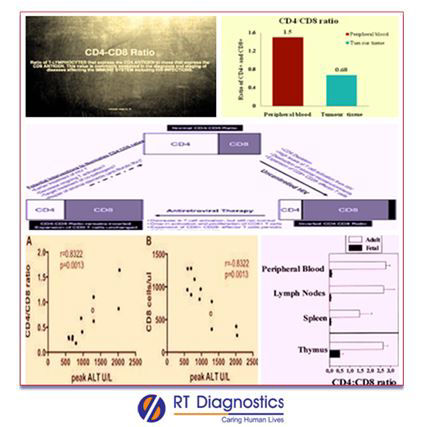CD4/CD8 RATIO:
Why CD4/CD8 Ratio Test?
CLINICAL INFORMATION
T cells are lymphocytes recognized by their cell surface markers as CD4 (T helper cells) or CD8 (killer cells) subtypes. CD4/CD8 Ratio helps to monitor patient immune system status. It compares the proportion of CD4 – T helper cells to CD8 –T killer cells. This value helps to predict the likely course of the disease and the outcome of the treatment. These test results are helpful in the diagnosis of certain conditions like the impaired immune system, immunodeficiency, or autoimmunity. A low CD4+/CD8+ ratio is indicated in disease conditions such as tuberculosis etc. While AIDS reflects an altered CD4+/CD8+ ratio (when compared with the normal population), thus indicating morbidity and mortality. Thus in chronic immune system disorders and/or diseases, the disease progression leads to the drastic decline of cell-mediated immunity and hence becomes more susceptible to opportunistic infections.

General Instructions:
Sample Requirement: Specimen - Blood sample collected from the vein. Test Preparation: None.
NOTE - Sample for specimen collections may vary based on the patient’s condition/cases according to the patient’s presenting complaints/signs or symptoms:
SPECIMEN REQUIREMENT (Special or Rare Cases) - As instructed and guided by Physician / Clinician / Pathologist / as per Laboratory’s requirements, according to procedures and protocols.
Sample Requirement: Blood Sample taken from the vein
Test Preparation: None
This Multi-Specialty Clinical Referral Laboratory RT DIAGNOSTICS provides precise and accurate tests with an extensive range of testing services to the medical centers to help in the diagnosis and identification of pathology in the test specimens for infectious diseases and also to evaluate the function of organ systems of the patient. It prevents further complications and helps to stabilize and restore health to near normalcy at the earliest without delay.



